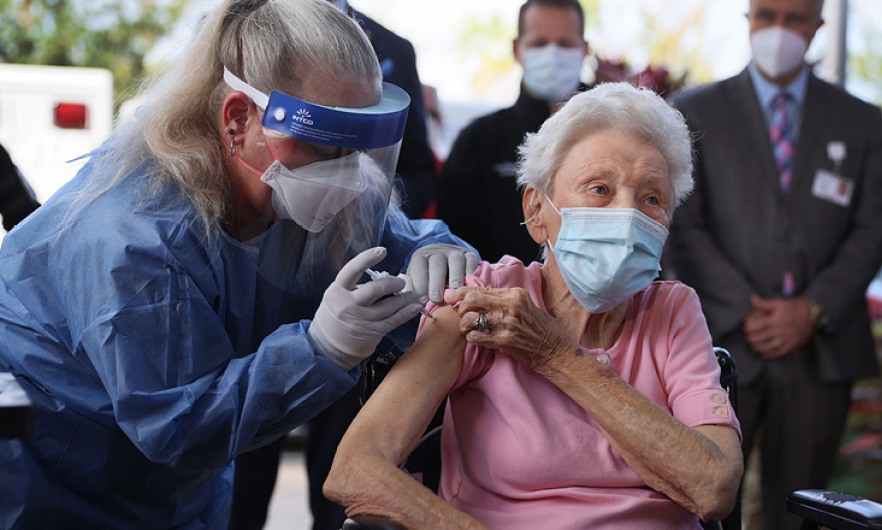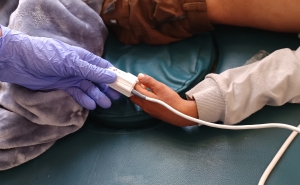Side Effects and COVID-19 Vaccines: What to Expect

It’s totally normal to experience side effects from COVID-19 vaccines. Here’s what you need to know.
A Q&A WITH WILLIAM MOSS
COVID-19 vaccines are the first to be produced using the mRNA platform.
These vaccines are highly effective, but they are also “reactogenic,” meaning that they’re likely to cause a noticeable immune response.
In this Q&A, expert epidemiologist and executive director of the International Vaccine Access Center William Moss, MD, MPH, answers questions about side effects of COVID-19 vaccines, what to know before and after your vaccination, and when to contact your doctor or a medical professional.
For more information, please visit the CDC’s resource, “What to Expect After Getting a COVID-19 Vaccine.”
What side effects should I expect from COVID-19 vaccines?
Side effects may vary with the type of COVID-19 vaccine. We know the most about side effects following vaccination with the Pfizer and Moderna messenger RNA—or mRNA—vaccines.
The most common side effect is soreness at the site of injection. Other side effects include fatigue, headache, muscle aches, chills, joint pain, and possibly some fever.
How long do side effects last?
Usually 24 to 48 hours, and no more than a few days.
Since COVID-19 vaccines come in two doses, will I experience the same side effects after each dose?
Side effects were more frequent after the second dose in the vaccine trials.
Do the side effects differ from one manufacturer’s vaccine to another?
Side effects are similar after the Pfizer and Moderna mRNA vaccines but could differ with other types of vaccines.
Why do these vaccines seem to have more noticeable side effects than the flu vaccine? How do they compare to other vaccines’ side effects—like the shingles vaccine, for example?
These side effects are typical of the inflammation induced by vaccines and are a sign of the body’s immune response to the vaccine.
Some vaccines are more reactogenic—the term used to describe these types of side effects—and some people have more severe reactions than others. The side effects of COVID-19 vaccines are similar to what is observed after the shingles vaccine.
Can side effects be more pronounced in people who are at higher risk of severe COVID-19 disease—i.e., people who are older, have comorbidities, etc.?
No—in fact, vaccine side effects have been less frequent and severe in adults older than 55 years in the vaccine trials.
Do children experience side effects from COVID-19 vaccines?
Children younger than 12 years of age have not yet received vaccines in clinical trials, so we do not yet know.
How do I know if what I am experiencing is normal or if I should alert my doctor or health care provider?
You will be told about the side effects of the vaccine and when you should consult a health care worker at the time you are vaccinated.
The Centers for Disease Control and Prevention advises that you should contact your doctor or health care provider if the redness or tenderness where you got the shot increases after 24 hours, or if your side effects are worrying you or do not seem to be going away after a few days.
Is it possible for me to contract COVID-19 between doses?
Yes—and this is why it is important to continue to wear a mask, practice social distancing, and wash your hands.
The first dose will not provide complete protection, and it will take about seven days after your second dose before you will achieve a full protective level of immunity that develops in about 95% of vaccine recipients. If you are exposed to SARS-CoV-2 before this time, it is possible that you could develop COVID-19.
Even once you have received both doses of the COVID-19 vaccine, it will still be important to continue practicing public health mitigation strategies like masks and distancing until the pandemic is under control and we know more about how the vaccines prevent transmission.
How will I know whether what I am experiencing are side effects or possible COVID-19 infection?
The side effects of the vaccine typically start within 12 to 24 hours of vaccination, but it may be difficult to tell the two apart if you become infected between vaccine doses.
If you experience side effects that last beyond 48 hours, you should contact your doctor or medical provider for advice.
William J. Moss, MD, is the executive director of the International Vaccine Access Center, deputy director of the Malaria Research Institute, and a professor in the departments of Epidemiology, International Health, and Molecular Microbiology and Immunology at the Johns Hopkins Bloomberg School of Public Health.
Photo at top: Joe Raedle





